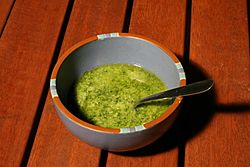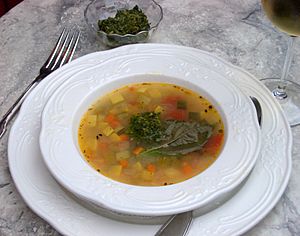Pistou facts for kids

Small serving dish of pistou
|
|
| Alternative names | Pistou sauce |
|---|---|
| Type | Sauce |
| Place of origin | France |
| Region or state | Provence |
| Serving temperature | Cold |
| Main ingredients | |
| Similar dishes | pesto |
Pistou (Provençal: pisto (classical) or pistou (Mistralian), pronounced [ˈpistu]), or pistou sauce, is a Provençal cold sauce made from cloves of garlic, fresh basil, and olive oil. It is somewhat similar to the Ligurian sauce pesto, although it lacks pine nuts. Some modern versions of the recipe include grated parmesan, pecorino, or similar hard cheeses.
Etymology and history
In the Provençal dialect of Occitan, pistou means "pounded".
The sauce is similar to Genoese pesto, which is traditionally made of garlic, basil, pine nuts, grated Sardinian pecorino, and olive oil, crushed and mixed together with a mortar and pestle. The key difference between pistou and pesto is the absence of pine nuts in pistou.
Use
Pistou is a typical condiment from the Provence region of France most often associated with the Provençal dish soupe au pistou, which resembles minestrone and may include white beans, green beans, tomatoes, summer squash, potatoes, and pasta. The pistou is incorporated into the soup just before serving.
Gruyère cheese is used in Nice. Some regions substitute Parmesan cheese or Comté. In Liguria, pecorino, a hard sheep's-milk cheese from Sardinia or Corsica is used. Whatever cheese is used, a "stringy" cheese is not preferred, so that when it melts in a hot liquid (like in the pistou soup, for instance), it does not melt into long strands.
See also
 In Spanish: Pistou para niños
In Spanish: Pistou para niños


